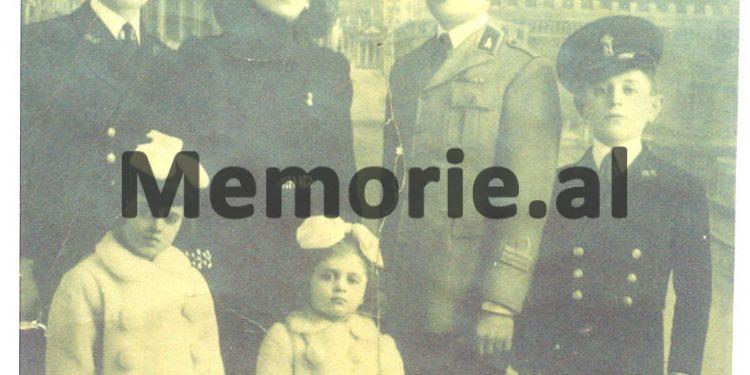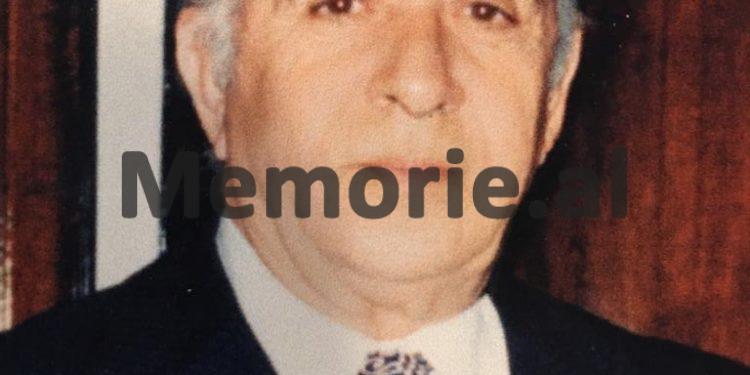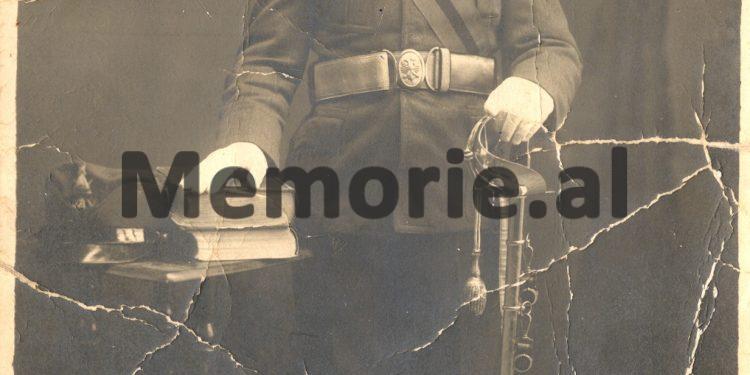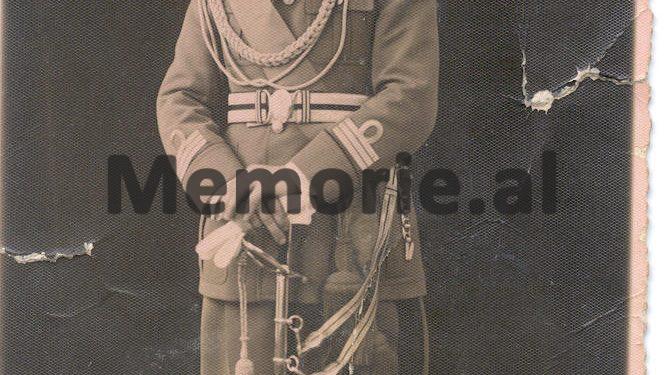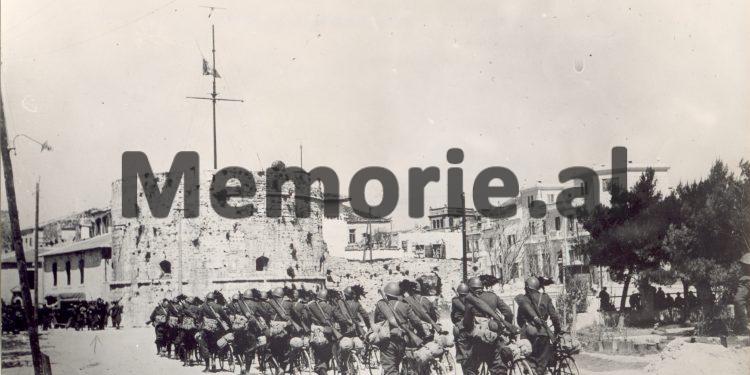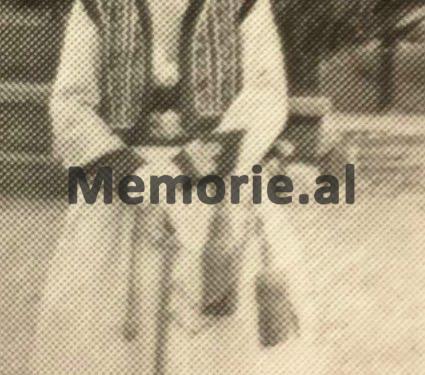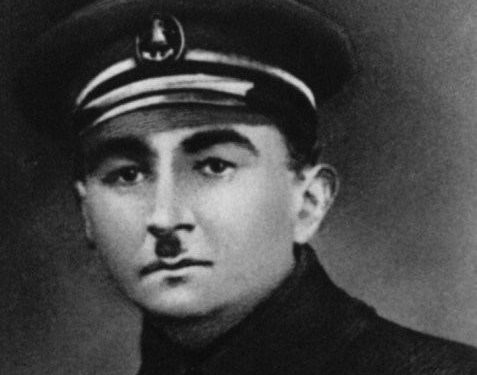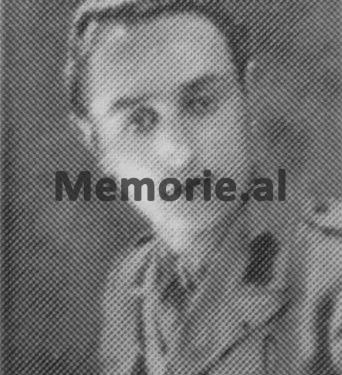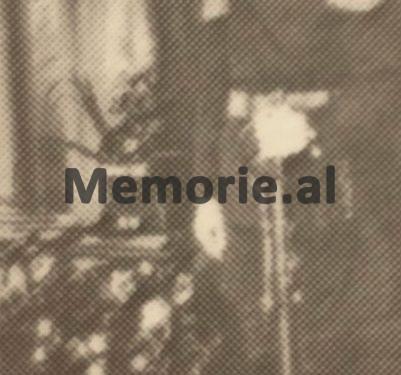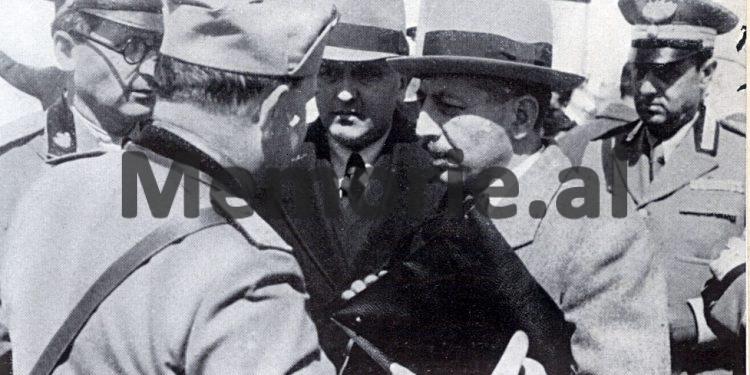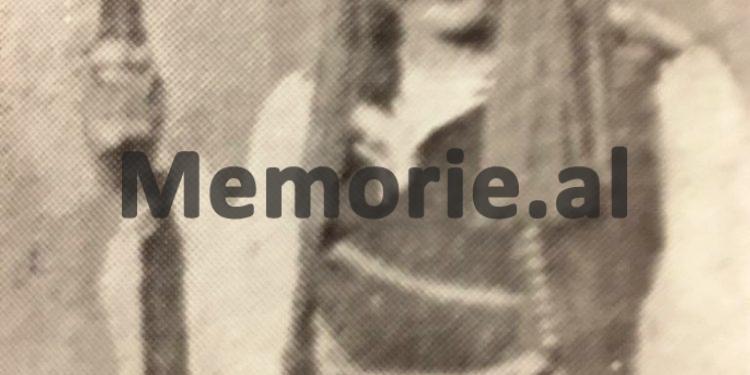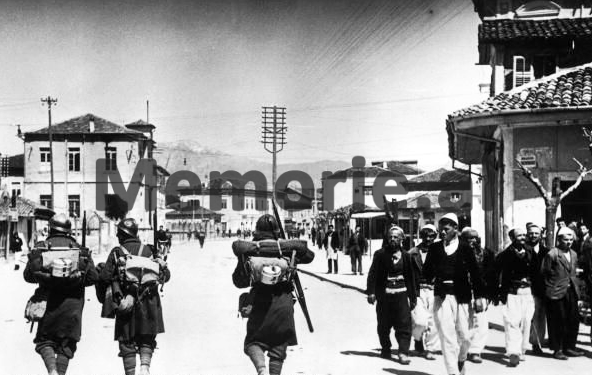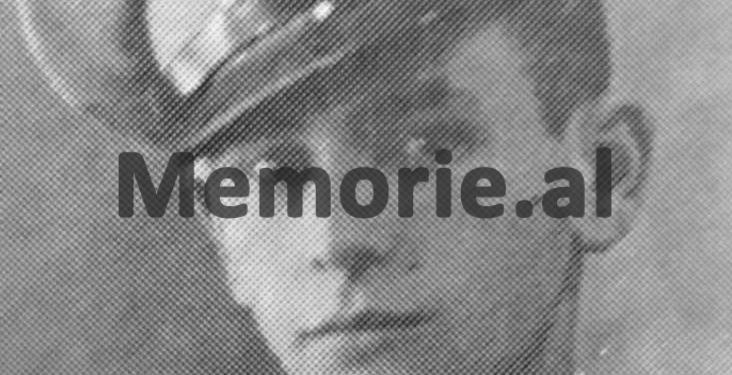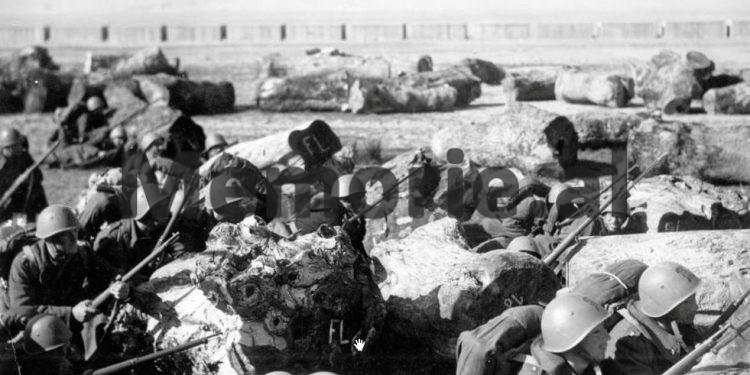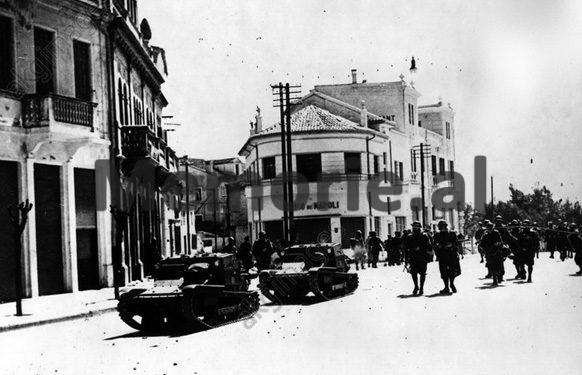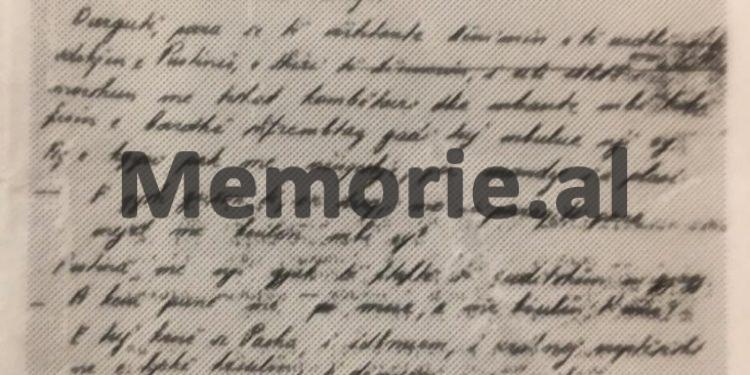Dashnor Kaloçi
Memorie.al publishes the unknown story of Captain Nuredin Pustina, originally from Dibra e Madhe and one of the most famous families of that province in the wars against the Turkish army forces commanded by Shefqet Dërgut Pasha and then the Serbo-Montenegrin ones, where some by her sons, three brothers: Bajram, Edip and Nuredin Pustina, during the Zog Monarchy period, after graduating from military schools and academies, inside and outside the country, served in various duties and functions in the National Army.
Unknown memories of Nuredin Pustina that are still preserved by his family, regarding the events of April 1939, where he was assigned and took part in the armed resistance against the Italian invaders in the district of Durrës, being the commander of Captain Mujo Ulcinj, who was killed by the Italians after he denounced them for removing artillery shells.
Nuredin’s meeting on April 12 with Mujo Ulqinaku’s family through the mediation of Sul Kapidani and the amount of 12 gold napoleons he gave them after they asked for help because they were in a difficult economic situation. The testimony of Nuredin’s son, Luan Pustina, regarding the brutal persecution of their family during the entire period of the communist regime, where the three brothers: Bajrami, Oedipus and Nuredin, suffered long imprisonment and internment.
“The first members of our family, starting with our great-grandfather Nurçe Pustina, as well as our grandfather Ali, have been very well known throughout the province of Dibra, as the leading leader of the anti-Ottoman uprisings and those against the invading Serbo-Montenegrin forces. Also in the years that followed, the tradition of our family, Pustina, was followed by Ali’s three sons: Bajrami, Oedipus and Nuredin, who served as soldiers of the Royal Army during the Zog Monarchy. The youngest of three brothers, Nuredin, on April 7, 1939, when the fascist aggression against our country took place, took place at the General Command of the Army in Durrës, where he fought together in a position with Mujo Ulqinaku, whom his subordinate had. Also during the occupation period when he served at the Recruitment Office in Shkodra, he helped the Anti-Fascist Movement, releasing many detainees from prisons, including Jordan Misja’s brother. But all that contribution, which our family had made for the benefit of the Albanian cause for two or three centuries, was completely forgotten by the communist regime that came to power at the end of 1944, and a long ordeal of suffering began with our family. arrests, imprisonment and internment ”. This is what Luan Pustina, the suckling of one of the most famous families of the Dibra Madhe parish, known for her contribution to the wars against the Turks and the Serbo-Montenegrins, told us about Memorie. al who told us the whole tragic story she suffered. family from the communist regime of Enver Hoxha. But what is the story of the Pustina family, who were the most vocal men of its trunk and how were they persecuted by the communist regime?
Ali’s imprisonment by Durgut Pasha
Much has been said and written about the history of the well-known Pustina family of the Dibra e Madhe parish, mainly during the time of the Zog Monarchy. One of those who wrote about the stories of this family was Terenc Toçi, former Secretary-General of the Prime Minister’s Office during Zog’s reign, who described an incident involving Ali Pustina when he was arrested by the soldiers of Durgut Pasha. Regarding this event, which Terenc Toçi published in the magazine “Shqiponja Arbnore”, it is said, among other things: immediately imprisonment of Paris. One of the detainees, Ali Pustina, told you that he was accused of spreading national propaganda and spreading Albanian books and that he found a weapon for the people and was sentenced to death. Before confirming the sentence and ordering Pustina’s death, Durguti summoned the convict, who was dressed in national clothes and wore a white crocodile on his head, almost covering one eye. Ay looked at him a little almost with a laugh, but then he burst out: How dare you, damn me, show up in front of me with the ball over my eye ?! Pustina with a strange cold blood was found: ‘Do you have anything to do with me, or with my ksula’ ?. They said that the angry Pasha ordered them to take off their hats, the convict waited for them: ‘It is the custom of Albanians to keep their hats in this way, and therefore this hat has to be replaced when my head is to be torn off’… Durguti was a heartless officer and had given enough evidence of this olive tree, especially in the Prefecture of Shkodra in 1910 and 1911, but as a brave soldier, he did not look down on the bravery of the enemy. So you were impressed by the courage of a man who was on the verge of death. He knew how to hold back his grief. Your behavior is that of a savage man, but it shows bravery, so I am forgiving your life and taking you to Anatolia, to eternal intimacy. ‘ On the second day, Ali Pustina left for exile under a strong guard, but on the road between Struga and Dibra e Madhe, with a mountaineer fox, he escaped the soldiers and duel in the mountains. After that, Turgut Pasha’s house was burnt down and his family was deported to Bitola “, concludes Terenc Toçi’s article about Ali Pustina, a brave Dibran who was not at all frightened by the threat of the terrible Turkish Pasha.
The murder of Ali Pustina
After a lifetime of fighting and uprisings against the Ottoman and Serbo-Montenegrin forces, Ali Pustina was assassinated in 1915. Regarding his assassination and the honor bestowed on him by the population of those three, his nephew, Luan Pustina, told us: made against the Serbian Government. On the way out of the village, they killed him and left him lying on the ground. After the news of his murder became known, the villagers of Okshtun came and took his body and buried it where it was killed, a few steps below the footpath that leads to Okshtun the Great. The news of Ali’s death was announced that day in the town of Dibra e Madhe, but Serbian authorities did not allow his family to open the mortuary in that town. Following this order, his family and relatives secretly gathered and wept over him in the village of Kllopcisht, but even there the women could not weep as usual, as they were under the surveillance of the Serbian authorities. After the funeral of Ali, the Ram Ram Hoxha arranged the grave and wrote an epitaph on it which reads: pass / please traveler / Albanian brothers / enjoy my soul/ sing Fatiha / Tell the barbarian of Serbia / Curses ”. In the years that followed, the village of Okshtun called Ali’s tomb a “good tomb” and villagers often went there. While immortalizing him in the memory of the inhabitants of those three, Hysen Kodra (the father of the martyr Siri Kodra), gave his name to a village school in the province of Golloborda “, Luan Pustina recalled, regarding the murder of his grandfather, Ali Pustina and the appreciation given to him by the villagers of Okshtun.
The three Pustina brothers, Monarchy officers
After the assassination of Ali Pustina, to escape the persecution of the Serbian army, his family moved from Dibra e Madhe and settled in Tirana. Ali Pustina’s family had a close friendship with the Zogolli family in Burgajet Matit, a friendship which had been established since the early 1900s when the heads of that house on the way to Istanbul rested at Pustinat in Dibra e Madhe. After leaving Dibra e Madhe, in 1916-1917, Ali Pustina’s family, his wife with three sons: Bajrami, Oedipus, Nuredin and daughter Menduhien, came and settled in Tirana. Regarding this, Ali’s nephew and Nuredin’s son, Luan Pustina, said: “When they came to Tirana, they bought a plot of land with the Tirana Reçi family and built three houses where Qemal Stafa Street is today.” The three boys were educated at the Military School for the Perfection of Officers in Tirana, to fulfill a wish left to them by their father Ali, since he was alive. After graduating from military schools, Bajrami was assigned to the Gendarmerie, and Oedipus, who rose to the rank of captain, served as a financier in the background of the Albanian Army, while Nuredin served in the Army Autoparties. Throughout the Bird Monarchy, the three Pustina brothers served faithfully in all the tasks assigned to them. Bajrami served mainly in Tirana, Oedipus in Tirana and Burrel, while Nuredin in Durrës and Shkodra. The three Pustina brothers maintained their friendship with King Zog’s family, who invited them whenever the Royal Court gave various receptions on holidays or ceremonies, “Luan Pustina recalled of his father Nuredin and his two uncles, Oedipus and Eid. who during the period of the Monarchy served as soldiers of King Zog.
Nuredin Pustina, commander of Mujo Ulqinaku
In the first days of April 1939, when fascist Italy carried out the military aggression against Albania, the third of the Pustina brothers, Nuredini, took place in the Officers’ Perfection Course in Tirana. On April 6, he was sent to the war front in the city of Durres and assigned to the Operational Command Headquarters which led the resistance under the command of Major Abaz Kupi. In the memoirs of Nuredin Pustina, which are still preserved by his family, regarding that event, he wrote: to the front. I went to Durrës and immediately started the family to Korça, to be freer. Those two days and two nights, I was part of the Headquarters of the Operational Command in Durrës. On April 6 and the night of April 7, we deployed the forces coming to Durrës, such as the heavy artillery that we took to the Church from Villa Street, commanded by the artillery lieutenant, Nazmi Baraka, and Gaqo Mosko. On April 7, they were the first to fire on the enemy fleet that had concentrated most of the warships against the Durrës pier. From the shells of these cannons, they also fell into the steamer that was the Italian colonel Petinasi, who had previously been the commander of the Albanian Army Artillery and when he later came to Tirana, he said: ‘I have taught you to shoot well with cannons. , but not against me ‘. On the night of April 6 in the evening, we sent dynamite to Shijak and demolished the Shijak bridge, where we set up the Këmbsorisë units coming from Elbasan, Tirana, and other districts. After two o’clock at night, Captain Mujo Ulqinaku left me and in the morning he went to Marina, to the Castle, near the Port. When we parted he told me he was going to leave the ring he had on his hand and we weren’t seen again. Before leaving, I gave him weapons from the warehouse. A few days ago, when I was coming from Tirana to visit my family in Durrës, Mujo told me that the Italians who were serving in our Navy were removing the needles from the big cannons that were in the fortifications near the Villa and on the way to the Church. I reported this to the Chief of Transportation at the Defense Command, Captain Ibrahim Ishmi, who informed the General, the Commander of the Defense, and from him, the notification was given to the Commander of the Navy in Durrës, warning the Italians of the Defense Command. The Italians found out about Mujo’s information and it seems that they did not forget it until they killed him. I, with the depot officers, had no soldiers under command, but we went ourselves to the front line. I joined the Border Guards, under the command of Border Commander Captain Kadri Rustemi (from Dibra). He called Captain Akil Sakic, who was the Battalion Commander, and told him: The Italians landed (on the pier) and started walking towards us. The company was positioned opposite the Bank, near Molos. The connection with Tirana was cut off, then Kadriu pulled out his revolver and fired first. That was the sign, the fire order. Then the whole company started firing. All the wards wherever they were started the zajar. The Italians were caught by surprise, as they did not expect resistance. Then the Italians withdrew, entered the steamer, but many of them were hit. He was killed and seriously injured. They were immediately sent to Italy, but a few days later we saw the former commander of the Navy, Major Tedei, and other marshals, with their arms tied and wounded. The Italians, after entering the boats that stood on the pier, pulled out other weapons and tanks, started the offensive with heavy weapons in all directions, that is, towards us who were near the Bank, from the Hotel to the castle, to Currilat, to AGIPI, on the Beach, opposite the Dajlan Bridge, etc. Enemy marines began firing from the sea, and some shells fell on the Flour Factory. After a while, the prisoners came to the front line and, after being armed, lined up to fight. Some of them we met later in Shijak, I took them by car to Tirana, they were injured. By order from Tirana, I was immediately sent to the Truck Department in Xhafzotaj-Durrës (where I served as an officer) to prepare other vehicles from the mobilization. Under the barrage of bullets I went to Durrës with a truck and there I prepared fifteen trucks and left for Durrës. When I arrived in Rrashbull the enemy had just fired heavy artillery, so it was impossible to cross and we took refuge in a ditch. Enemy planes were flying over our heads. After a while, the friends we had left in Durrës started coming, who were withdrawing by order. Then we joined and headed to Tirana. When we arrived at Hamit Bey’s Hani, in front of Vora, we found a battalion that had taken up a fighting position. We were also invited to take positions. We accepted and stopped. After a while, this department is sent to Tirana. On April 8, Tirana was occupied by enemy armies and the King and government had left for Greece. On April 12, I return to Durrës. The first job I did was look for Mujo’s family because I knew it was bad financially. I contacted them through Sul Kapedan and they asked me for financial help. Then I collected 12 gold napoleons and gave them to him. They went to Seman, to their uncles “, concludes the story of Nuredin Pustina, regarding the event of April 7, 1939, where he supplied Mujo Ulqinaku with weapons. During the years of fascist occupation of Albania, like many Albanian soldiers, Nuredin Pustina responded to the call to serve in the National Army. During the years 1940-’42 he served in the Recruitment Office in the city of Shkodra where he gave a great help to the Antifascist Movement, freeing from prison many Shkodra communists, including the brother of Jordan Misja. In 1943, Nuredin was appointed commander of the Lezha Garrison, where together with Syria and Shaban Strazimir, he organized the escape of the forces of that garrison, which was dispersed. After that, Nuredin went to the province of Dibra where he met his old friend Dali Ndreu. Although Nuredin provided significant assistance to the Anti-Fascist Movement, he refused to join the partisan forces.
Captain Mefail Pustina, fought in Africa
In addition to the three Pustina brothers, their first cousin, Mefail Pustina (born 1914), who graduated from the Turin Military Academy, also served in King Zog’s army. After graduating from the Academy in the late 1930s and early 1940s, as an Italian army officer, Captain Mefail Pustina was sent to the war front in North Africa. In this regard, Luan Pustina testifies: “One of Mefail’s former colleagues and close friends, General Cotta, told me that around 1943, when the Italian army was withdrawing from Tunisia, the ship they were sailing in hit by a plane shell. In those moments all the soldiers were thrown into the sea and while they were without any hope of salvation, Mefaili was able to detach a boat from the sinking ship, where all the soldiers boarded. That courage that Mefaili showed to save all his comrades from certain death at the bottom of the sea, they never forgot. So after 1945, when Mefaili returned to Albania, every time they gathered at various ceremonies in Italy, they left an empty chair with the name of their former Albanian colleague, Mefail Pustina, and raised the first toast to him.” shows Luan Pustina, the testimony of the Italian general Cotta, for his cousin Mefailin, who after returning to Albania joined and fought with the partisans. After the end of the war, Mefaili served in the Genoese weapon of the Albanian Army and directed the works for the opening of the Kukës-Peshkopi Road, Gramsh-Lozhan, etc. Although he made a major contribution to the construction of the genius, he could not escape the shock wave of the communist regime’s targeting of all Western-graduated military personnel.
The Pustina brothers, prison and exile
Shortly after the end of the war, when the Communists came to power, the Pustina family was one of the first to be hit. After their homes in Tirana were confiscated, the communists then began arresting them. In this regard, Luan Pustina stated: “Since the beginning of 1945, my uncle, Bajram Pustina, was arrested on charges of having participated with a group of officers who had guarded the Skanderbeg Crown that had been taken to Rome. Also, one of the other accusations made against him was his participation in the Military Court in Tirana during the time of the Germans. Bajrami was taken to the Special Court and initially sentenced to death and then to life imprisonment. After suffering for 15 years in Burrell Prison, he died of a serious illness in 1962. In 1947, my father Nuredin, who was in hiding in Tirana at the time, was arrested. escape the revenge of the communists. After being held for six months by the investigator, Nuredin was sentenced to three years in prison, which he served in the Maliq Camp while working to dry up the swamp. After his release from prison, Nuredin worked as a municipal worker and road construction company. Similarly, after the arrest of Bajrami and Nuredin, the Communists’ revenge fell on the family of another uncle, Oedipus, who was interned with his family in Elbasan, where he lived until the 1970s. When they returned to Tirana, they lived in a dilapidated barracks because their home had been nationalized. Throughout the communist regime, the three Pustina brothers’ families were declared reactionary families, and their children worked hard. Out of the whole tribe, only I could finish high school at night “, Luan Pustina, one of the sucklings of that family, one of the most famous of the parish of Dibra e Madhe, ended his story.
Mustafa Qemal Ataturk awarded Hajredin Pustina
In addition to the family of Ali Nuredin Pustina, the leader of the Dibra volunteers who fought for years against the Ottoman and Serbo-Montenegrin forces, from that trunk of the well-known tribe of the Greater Dibra Parish, many other men have made a name for themselves. big. As was Sefedin Pustina, who in 1912 was the Chairman of the Government of Great Dibra. Another well-known man of this family was Hajredin Pustina, who in the first years of the last century, served as kajmekam in the Turkish vilayets located in the European part of the Turkish Empire. In the last years of the dissolution of the Ottoman Empire, he served as Kajmekam in the city of Thessaloniki. In 1916, he saved the lives of several Turkish officers, including Mustafa Kemal (Ataturk). After Qemal Ataturk came to power, as a token of gratitude, he presented Hajredin Pustina with a palace in the center of Istanbul, which is still owned by the descendants of the Pustina family. Also one of the other suckers of the Pustina tribe was Dr. Masar Pustina, who after the end of the war, escaped from Albania to the United States, where he was elected Chairman of the National Council of the Legality Movement. From the trunk of the famous Pustina family, there were also four intellectual brothers: Nazim, Irfan, Sefedin and Skënder Pustina. Irfani has been a Doctor of Medical Sciences and Director of the Tirana Civil Hospital. Sefedini had also graduated in Medicine, while Nazimi graduated from the Military Academy in Modena, Italy. In 1944, Irfan was arrested by the Germans for treating Peza’s partisans. The crackdown on the four Pustina brothers began in 1946 when Irfani and Nazimi, who had been the Commander of the Dibra District, a military adviser to the Prime Minister and a Lecturer at the School of Officers in Tirana, were arrested. Nazimi was sentenced to 20 years in prison, while Irfani was initially sentenced to death, but was later pardoned for working as a free doctor in the city of Vlora. After Nazim and Irfan were sentenced, their families were interned in Kruja and the persecution against them continued until the fall of the communist regime. Memorie.al




